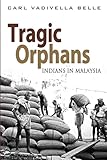Tragic Orphans : Indians in Malaysia / Carl Vadivella Belle.
Material type: TextPublisher: Singapore : ISEAS Publishing, [2014]Copyright date: 2014Description: 1 online resource (512 p.)Content type:
TextPublisher: Singapore : ISEAS Publishing, [2014]Copyright date: 2014Description: 1 online resource (512 p.)Content type: - 9789814519038
- 9789814620123
- 305.5 23
- DS595.2.E2 B45 2015
- DS595.2.E2 B45 2015
- online - DeGruyter
| Item type | Current library | Call number | URL | Status | Notes | Barcode | |
|---|---|---|---|---|---|---|---|
 eBook
eBook
|
Biblioteca "Angelicum" Pont. Univ. S.Tommaso d'Aquino Nuvola online | online - DeGruyter (Browse shelf(Opens below)) | Online access | Not for loan (Accesso limitato) | Accesso per gli utenti autorizzati / Access for authorized users | (dgr)9789814620123 |
Browsing Biblioteca "Angelicum" Pont. Univ. S.Tommaso d'Aquino shelves, Shelving location: Nuvola online Close shelf browser (Hides shelf browser)

|

|

|

|

|

|

|
||
| online - DeGruyter Trade, Development, and Political Economy in East Asia : Essays in Honour of Hal Hill / | online - DeGruyter The South China Sea and China-ASEAN Relations / | online - DeGruyter Templer and the Road to Malayan Independence : The Man and His Time / | online - DeGruyter Tragic Orphans : Indians in Malaysia / | online - DeGruyter General Ne Win : A Political Biography / | online - DeGruyter China's Economic Engagement with Southeast Asia : Singapore / | online - DeGruyter Johor Survey : Attitudes towards Governance and Economy, Iskandar Malaysia, and Singapore / |
Frontmatter -- CONTENTS -- ACKNOWLEDGEMENTS -- ABBREVIATIONS -- INTRODUCTION -- 1. The Malay Peninsula: Early History, Melaka and the Colonial Setting -- 2. European Colonialism and the Malay Peninsula -- 3. India and the Development of British Ideologies of Empire -- 4. British Governance of Malaya -- 5. Slavery and Indentured Labour -- 6. Indian Indentured Labour in Malaya -- 7. Kangany Labour in Malaya -- 8. Other Indian Immigration -- 9. Indian Political Development to 1941 -- 10. The Japanese Invasion, Subhas Chandra Bose and Indian Wartime Nationalism -- 11. The Post-war Period: Reform and Repression: 1945–48 -- 12. From Federation to Merdeka -- 13. From Malaya to Malaysia: Singapore, 13 May and the New Economic Policy -- 14. The Mahathir Years: A Changing Malaysian Landscape -- 15. Abdullah Badawi, Islamization, and the Rise of Hindraf -- 16. Najib and 1Malaysia: A New Deal? -- CONCLUSIONS -- BIBLIOGRAPHY -- Index
restricted access online access with authorization star
http://purl.org/coar/access_right/c_16ec
In 1938, noting that the bulk of the Indian population formed a “landless proletariat” and despairing of the ability of the factionalized Indian community to unite in pursuit of common objectives, activist K.A. Neelakanda Ayer forecast that the fate of Indians in Malaya would be to become “Tragic orphans – of whom India has forgotten and Malaya looks down upon with contempt”. Ayer’s words continue to resonate; as a minority group in a nation dominated politically by colonially derived narratives of “race” and ethnicity and riven by the imperatives of religion, the general trajectory of the economically and politically impotent Indian community has been one of increasing irrelevance. This book explores the history of the modern Indian presence in Malaysia, and traces the vital role played by the Indian community in the construction of contemporary Malaysia. In this comprehensive new study, Carl Vadivella Belle offers fresh insights on the Indian experience spanning the period from the colonial recruitment of Indian labour to the post-Merdeka political, economic and social marginalization of Indians. While recent Indian challenges to the political status quo — a regime described as that of “benign neglect” — promoted Indian hopes of reform, change and uplift, the author concludes that the dictates of political discourse permeated by the ideologies of communalism offer limited prospects for meaningful change.
Mode of access: Internet via World Wide Web.
In English.
Description based on online resource; title from PDF title page (publisher's Web site, viewed 26. Aug 2024)


